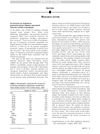 31 citations,
June 2020 in “Dermatologic Therapy”
31 citations,
June 2020 in “Dermatologic Therapy” Patients with chronic skin conditions on systemic treatments did not have worse COVID-19 outcomes and could resume their treatments after recovery.
 14 citations,
July 2021 in “Reviews in endocrine and metabolic disorders”
14 citations,
July 2021 in “Reviews in endocrine and metabolic disorders” SARS-CoV-2, the virus causing COVID-19, can affect all endocrine organs and systems, altering their function and potentially leading to disorders. Factors like diabetes and obesity increase infection risk and severity. Understanding these effects is key for effective treatment.
 April 2023 in “Journal of Investigative Dermatology”
April 2023 in “Journal of Investigative Dermatology” Protein analysis shows aging changes in scalp cell types from women.
 November 2022 in “Journal of Investigative Dermatology”
November 2022 in “Journal of Investigative Dermatology” Skin aging and cancer development are influenced by the competition between stem cells.
 November 2022 in “Journal of Investigative Dermatology”
November 2022 in “Journal of Investigative Dermatology” Low oxygen levels affect the behavior of certain proteins in human skin cells.
 November 2022 in “Journal of Investigative Dermatology”
November 2022 in “Journal of Investigative Dermatology” Human-induced stem cell-created skin models can help understand skin diseases by studying the skin's layers.
 11 citations,
December 2020 in “Journal of Drugs in Dermatology”
11 citations,
December 2020 in “Journal of Drugs in Dermatology” COVID-19 can cause various skin symptoms that usually improve with proper treatment.
 February 2024 in “BMJ Open”
February 2024 in “BMJ Open” The study concluded that different treatments reduced post-COVID symptoms over time and that factors like age, severity, and comorbidities affect symptom risk.
 1 citations,
December 2022 in “PubMed”
1 citations,
December 2022 in “PubMed” Psoriasis treatments don't raise severe COVID-19 risk, except for acitretin.
 7 citations,
January 2021 in “Biology”
7 citations,
January 2021 in “Biology” Some COVID-19 patients have different skin problems, which might be the only sign of the virus or related to other health issues.
 October 2021 in “Nepal journal of dermatology, venereology & leprology”
October 2021 in “Nepal journal of dermatology, venereology & leprology” COVID-19 can cause skin problems directly or from using protective gear and sanitizers, and knowing this can help treat patients better.
 49 citations,
May 2020 in “Frontiers in Public Health”
49 citations,
May 2020 in “Frontiers in Public Health” Insulin resistance linked to obesity may increase COVID-19 severity.
 15 citations,
April 2022 in “Immunology”
15 citations,
April 2022 in “Immunology” Men and women get COVID-19 at similar rates, but men tend to get sicker and have a higher risk of dying, while women usually have stronger immune responses and vaccine reactions.
 August 2023 in “International Journal of Dermatology”
August 2023 in “International Journal of Dermatology” COVID-19 and its vaccines can cause various skin issues, with urticaria being the most common.
 139 citations,
December 2020 in “Cell Stem Cell”
139 citations,
December 2020 in “Cell Stem Cell” Male hormones affect COVID-19 severity and certain drugs targeting these hormones could help reduce the risk.
5 citations,
May 2020 in “Journal of the American Academy of Dermatology” AGA might indicate higher risk for severe COVID-19.
 1 citations,
July 2021 in “Journal of The American Academy of Dermatology”
1 citations,
July 2021 in “Journal of The American Academy of Dermatology” Face mask-related injuries in U.S. emergency departments rose by 2400% during the COVID-19 pandemic, with most injuries being dermatitis and lacerations.
 68 citations,
May 2021 in “Endocrine”
68 citations,
May 2021 in “Endocrine” People with diabetes or obesity should manage their conditions carefully as they have a higher risk of severe COVID-19.
 1 citations,
November 2022 in “Cureus”
1 citations,
November 2022 in “Cureus” Some COVID-19 patients have skin issues, with men, ICU patients, and those on multiple antibiotics at higher death risk; in-person skin checks by dermatologists are more effective.
 6 citations,
September 2020 in “Journal of The American Academy of Dermatology”
6 citations,
September 2020 in “Journal of The American Academy of Dermatology” Severe male balding may increase the risk of serious COVID-19, and treatments that reduce androgens or block a specific enzyme might help protect these individuals.
 January 2023 in “Journal of men's health”
January 2023 in “Journal of men's health” Higher dihydrotestosterone may be linked to more inflammation in COVID-19 patients with low testosterone.
 November 2020 in “Journal of Bioengineering and Technology Apllied for Health”
November 2020 in “Journal of Bioengineering and Technology Apllied for Health” COVID-19 affects multiple body systems and complicates treatment; accurate testing is crucial.
 7 citations,
July 2020 in “Journal of The American Academy of Dermatology”
7 citations,
July 2020 in “Journal of The American Academy of Dermatology” Skin symptoms linked to COVID-19 are hard to confirm, and more testing is needed to identify which are truly caused by the virus.
 8 citations,
May 2021 in “Journal of the European Academy of Dermatology and Venereology”
8 citations,
May 2021 in “Journal of the European Academy of Dermatology and Venereology” A COVID-19 patient had unusual nail discoloration and nail separation possibly due to the virus's effects on small blood vessels.
 November 2021 in “Research Square (Research Square)”
November 2021 in “Research Square (Research Square)” The research found that COVID-19 survivors experienced long-term effects like anemia and hypertension, with age and gender being important factors, but race, income, and education had little to no impact.
 26 citations,
September 2020 in “Journal of the European Academy of Dermatology and Venereology”
26 citations,
September 2020 in “Journal of the European Academy of Dermatology and Venereology” A certain genetic variant in the androgen receptor may predict the severity of COVID-19 in men.
 1 citations,
March 2021 in “The Journal of Sexual Medicine”
1 citations,
March 2021 in “The Journal of Sexual Medicine” The letter suggests testosterone replacement therapy might worsen COVID-19 outcomes.
 March 2022 in “medRxiv (Cold Spring Harbor Laboratory)”
March 2022 in “medRxiv (Cold Spring Harbor Laboratory)” People with blood group O may have a higher risk of developing post-COVID-19 syndrome.
 21 citations,
January 2021 in “Therapeutic Advances in Endocrinology and Metabolism”
21 citations,
January 2021 in “Therapeutic Advances in Endocrinology and Metabolism” Testosterone may have a dual role in COVID-19, potentially worsening outcomes in men, and testosterone therapy could help some patients, but more research is needed.
 April 2022 in “International journal of respiratory and pulmonary medicine”
April 2022 in “International journal of respiratory and pulmonary medicine” People with lower levels of free testosterone tend to have worse COVID-19 outcomes.




























